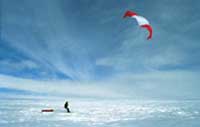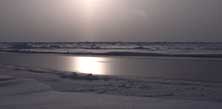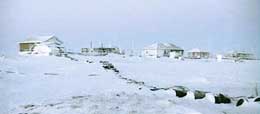|
|
|
The
two men continue to make slow progress - 6.1 km today, plus 2.34 km
of drift to the North during the night - caused by the open water that
is around them at every turn (once again this evening they had to stop
when they came up against a channel that looked difficult to cross).
That's what Dixie and Alain said to each other some hours ago, at 7.45 am to put is more precisely (3.45 pm down there), when they decided to stay there for the day. Tired, but obviously increasingly satisfied to be where they are and, above all, more and more motivated (they were already by 100%) by all the encouragement which is building up to support their adventure. That's when we took the chance to read some quick messages to them : though they had advised us before leaving to avoid all outside contacts (apart from the HQ connections), we sensed true emotion when we read e.g. Emily's message to them. A new
trial of the powerkites (21 m² sail) : positive. Two open water
: routine. Sledging remains extremely difficult : no luck, but let's
hope for better days. Five hours' walking ; this has been enough.
By
satellite, 9 pm (local time), 1 pm Brussels time. The two men
are clearly a lot more relaxed, they have now hit their straps
as we were saying yesterday and getting organised. While Hubert
was on the phone, Dixie was smoking his first pipe. "But
at least it's good tobacco," said Alain "And
it smells good. So that's OK..."
Particular
satisfaction regarding the sledges, which are performing very
well when it comes to crossing stretches of water. The spades
(which they are using as paddles) work well, the sledges are
totally buoyant and split the ice like ice-breakers, it appears.
So the good people at Aeriane did excellent work. "We should
not forget," explained Alain, "that it is like being
in a liquid environment and that we are in the middle of the
Arctic Ocean..." After
setting out at 10 am this morning (they need around 3 hours
to strike camp), they stopped their march at 4.45 pm and spent
an hour brushing their clothes, as they do every day.
Thursday
1pm, 9 pm out on the pack ice, minus 36°C. The very least
you can say is that the two men spent a difficult night and
also had an unusual awakening. You remember that yesterday they
had to move the tent a number of times because the ice was moving
so much and so dangerously. They finally found somewhere more
or less safe to shelter - the size of a football pitch, they
said. But in the small hours of the morning, the two Belgian adventurers were amazed to see the terrain behind them to the south - i.e. the ice they had crossed the day before - had turned into an inland sea. Not one of the compression zones they had struggled across the previous day was visible above the surface of the water. Where had they gone ? Swallowed in the gigantic drifting moving of the pack ice. And to cap it all, the tent - their so-called safe haven for the night - was barely 20 metres away from this vast stretch of water... Without
panicking, the two men got up and left two hours later. As on
the previous days, the terrain is still flat - so it's good
from that point of view, but at the same time it's terrible
for skis or sledge runners - too soft, too much water. You might
well wonder how this type of conditions are possible when the
temperature is minus 35°C during the day and even worse
at night. Whatever, it all makes progress very slow and difficult
- just 3.5 km covered yesterday. Fortunately
there are still some relatively untouched and unsullied areas
in this battered old world of ours (which can be so wonderful
sometimes, despite everything). Places where homo sapiens, whom
we also have the bad habit of calling "civilised"
man, has never set foot. These are rare places lost in the furthest
reaches of the Amazon forests, a few forgotten islands scattered
like grains of sand across the Indian Ocean and, of course,
the polar regions, with the Antarctic icecap and the Arctic
pack ice. As you read these lines, the two Belgians, Dixie Dansercoer and Alain Hubert are in one of these marvellous places on our planet. Depending
on the time difference (GMT+ 9, Belgium +8) and the time you
are reading these few lines (statistically, most visits to antarctica.org
are between 8 and 9 in the evening), you can imagine what they
are in the process of doing. They're
out there on the ice, certainly hauling their sledges over
the dreadful lumps and bumps of the ice; they will also be carrying
the sledges between them because they're too heavy - this is
one of the remarks made often during the latest satellite contacts,
they had not mentioned the extreme heaviness of the sledges
before - or they are carefully picking their way past a hole
in the ice. In everything they do, they are slowly putting into
practice the harmonious muscular movements that Frank De Witte
and the other trainers at the Belgian Olympic Committee drummed
into them for months.
If
they have set up camp, they'll be working in their tent,
each one being careful not to trespass on the other's 2 sq.m.
of comfort zone. One of them will be preparing the evening meal
(dehydrated organic soup, a slab of food to be stirred into
the hot water and made up of mashed potato, polyunsaturated
oil, MGLA, dehydrated chicken or fish, ground up cereal), while
the other is doubtless repairing the tent pegs. Outside, the
temperature is minus 35°C! (Talking about food, next
week we will be publishing an interesting piece that Arnaud
Tortel, the expedition dietitian, has just sent us - everything
you need to know about the polar diet). We
often ask ourselves why these extraordinary men set off to find
the impossible at the ends of the earth the way they do: what
Alain Hubert and Dixie Dansercoer are in the process of experiencing
- with the living, freezing water turning into pack ice before
their very eyes - is without a shadow of a doubt one of the
answers.
Wednesday 5 pm, 9 pm out on the pack ice. Minus 36°C.
Indifferent communication with the satellite. While waiting for a satellite slot, here is an episode from "Mad Max with icicles"... Wednesday,
4 pm: the exciting story from Remy Revellin (who coined the
expression "Mad Max with icicles"), who went with
the two men to film the expedition's departure on the island
of Koteln'iy, has just reached us.
No
more concerns regarding Hubert's numb fingers, because his fingertips
that were blue yesterday turned white today, which is a good
sign. Apart
from that, the pair have experienced a few problems putting
the tent up and with the tent pegs that they have had to repair.
Then the stove caught fire... But it's all in a day's work for
two men who are used to living under these conditions. All that
seems to be worrying them a little now is the cold and the wind-chill
factor (they had to cope with 30 km/h north-easterlies today).
Which is why they have decided not to have any more breaks once
they were underway : their main fear is the more serious one
of frostbite. And finally, they did not come across any more
bear tracks today. Another important point: the food is excellent.
In the morning they fill a thermos with some good nourishing
soup that they drink along the way. In a word, morale is on
the up... ----------------------------------------------- One
small piece of news before heading out on to the pack ice in
the afternoon. Yesterday, Monday, our site received 2 302 visits,
making a total of 29 185 pages visited (printed) and 500 148
hits…
We
would also like to take this opportunity to thank everyone for
the faith they have placed in us and particularly to tell them
that we are inviting anyone and everyone to send us their columns
and notes (a few lines would be enough - or a few pages, if
you prefer), because we would very much like to get to know
the people who surf their way to our site. That way, we will
be able to establish a more direct - more personal - link between
the expedition HQ (Michel Brent, Dung Van Meerbeeck) and all
of the good people out there who visit our pages on a daily
basis. Our aim is to publish a "readers write" column,
as it were. Letters that will not be published so much on our
"Mail" pages, but here on the "Live" page,
once a week or more frequently, depending on the amount of mail
we receive. We'll
let you know shortly if the storm is still raging out on the
pack ice and how Alain has gone about treating his numb fingertips
and hand.
8.00
pm local time (midday back home) : our men were only able
to advance 4.5 km today. The reason was a dreadful storm that
blew up out on the pack ice, with winds blowing at over 50 to
60 km/h and visibility reduced to around 50 metres. So they
thought it best to call a halt and shelter in their tent. We
have just had Remy Revellin on the phone (from Yakutz), who
had the time to say that it had really been hell for the guys
down there and that the island of Koteln'iy, where the
men set out from, is like Mad Max with icicles. We asked
Remy to write up his diary for the trip during the return flights.
We should be able to publish it for the end of the week... The
two men set off from the Koteln'iy weather station in dramatic
circumstances. One of the men stationed there, in this forgotten
place at the ends of the Earth had inflicted a serious stab-wound
on his boss who had traveled on the journey from Tiksi to the
New Siberia Islands on board the MI8 helicopter chartered by
the expedition and had criticized some aspects of his work. We
will probably have another satellite session before this evening.
|




 movements
caused by the full moon and have incredible power. It's very
impressive. We didn't make much progress today, 5 hours on the
march to cover about 4 km. We lost a bit of time because we
tried out the big parafoils on a fairly flat bit of terrain
and they worked perfectly with a southerly breeze of 10 km/h.
movements
caused by the full moon and have incredible power. It's very
impressive. We didn't make much progress today, 5 hours on the
march to cover about 4 km. We lost a bit of time because we
tried out the big parafoils on a fairly flat bit of terrain
and they worked perfectly with a southerly breeze of 10 km/h.
